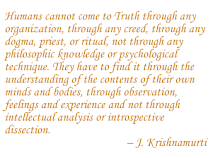Truth is a pathless land, and you cannot approach it by any path whatsoever, by any religion, by any sect. Truth, being limitless, unconditioned, unapproachable by any path whatsoever, cannot be organized; nor should any organisation be formed to lead or to coerce people along any particular path.As one might guess from the a careful listening to some of Van Morrison's lyrics, there is a connection between Van and Krishnamurti. The book Krishnamurti: 100 years by Evelyn Blaugh contains a quote from Van Morrison (page 237):
Although I came across and read Krishnamurti's books in the early 1970s, I only heard him speak once, at Masonic Hall in San Francisco. As far back as I can remember I have been influenced by religious and philosophical works and I had a big change in my state of mind just prior to discovering Krishnamurti's books. His philosophy corresponded to what I myself was going through on an inward level. I feel the meaning of Krishnamurti for our time is that one has to think for oneself and not be swayed by any outside religions or spiritual authorities. Some time ago I wrote "In the Garden" from my album No Guru, No Method, No Teacher. Part of the lyrics are:A couple of other quotes by Jiddu Krishnamurti follow:And then one day you came back homeThe song concludes with:
You were a creature all in rapture
You had the key to your soul
And you did open that day you came back to the garden
In the garden, in the garden, wet with rain
No Guru, no method, no teacher
Just you and I and nature
And the Father in the garden
Perhaps you have never experienced that state of mind in which there is total abandonment of everything, a complete letting go. And you cannot abandon everything without deep passion, can you? You cannot abandon everything intellectually or emotionally. There is total abandonment, surely, only when there is intense passion. Don't be alarmed by that word, because a man who is not passionate, who is not intense, can never understand or feel the quality of beauty. The mind that holds something in reserve, the mind that has a vested interest, the mind that clings to position, power, prestige, the mind that is respectable, which is a horror - such a mind can never abandon itself.In the state of passion without a cause there is intensity free of all attachment; but when passion has a cause, there is attachment, and attachment is the beginning of sorrow. Most uf us are attached, we cling to a person, to a country, to a belief, to an idea, and when the object of our attachment is taken away or otherwise loses its significance, we find ourselves empty, insufficient. This emptiness we try to fill by clinging to something else, which again becomes the object of our passion. Examine your own heart and mind. I am merely a mirror in which you are looking at yourself. If you don't want to look, that is quite all right; but if you do want to look, then look at yourself clearly, ruthlessly, with intensity - not in hope of dissolving your miseries, your anxieties, your sense of guilt, but in order to understand this extraordinary passion which always leads to sorrow. When passion has a cause it becomes lust. When there is passion for something - for a person, for an idea, for some kind of fulfillment - then out of that passion there comes contradiction, conflict, effort. You strive to achieve or maintain a partcular state, or to recapture one that has been and is gone. But the passion of which I am speaking does not give rise to contradiction, conflict. It is totally unrelated to a cause, and therefore it is not an effect.


No comments:
Post a Comment